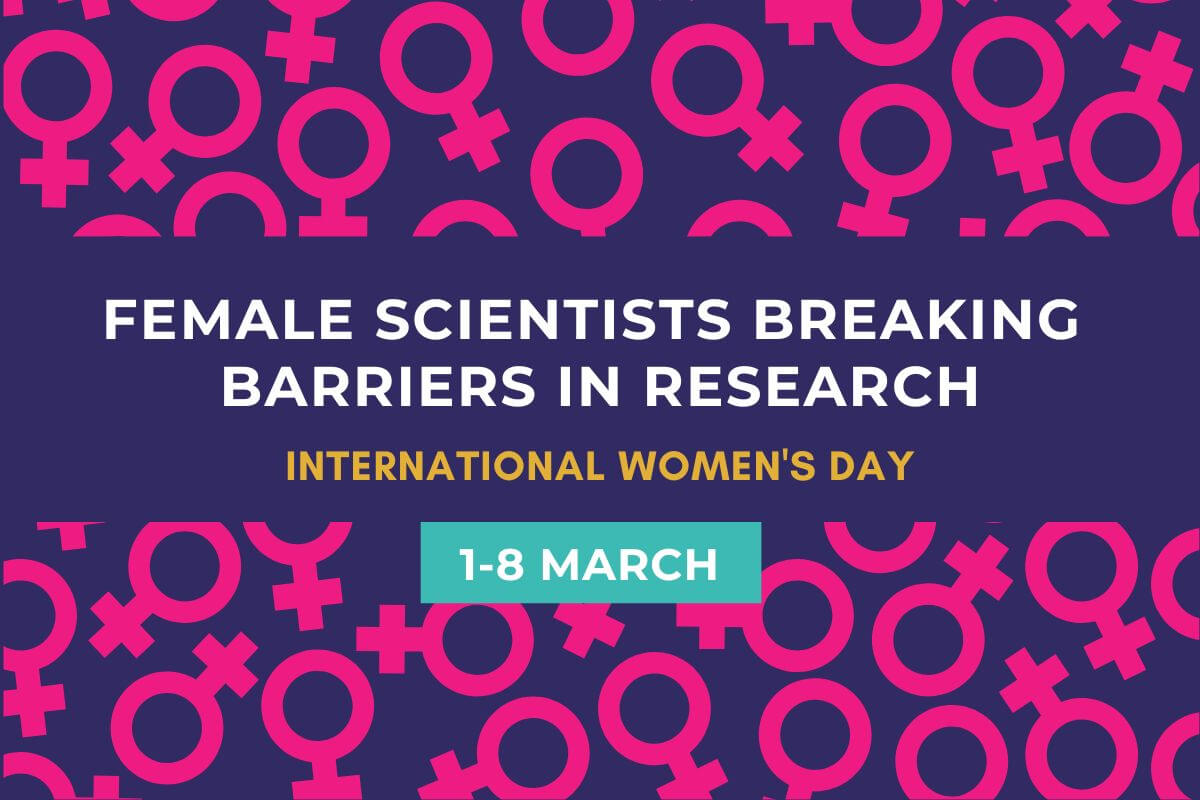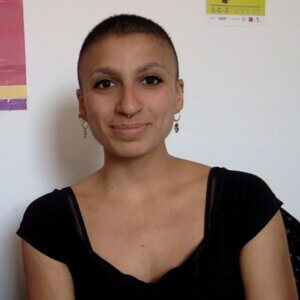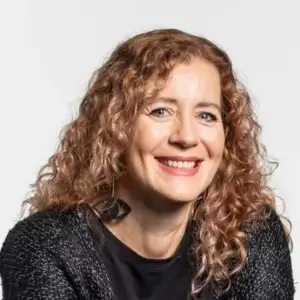Interviews: Female scientists breaking barriers in research


The International Women’s Day is an international observance celebrated all over the world to „recognize the achievement of women without regard to divisions, whether national, ethnic, linguistic, cultural, economic or political“ (United Nations).
International Women’s Day has been acquiring a new global dimension for women in developed and developing countries alike. In Ulysseus, we are joining the global activities and conversation by launching „Female scientists breaking barriers in research“, a series of interviews to female researchers of Ulysseus whose research is focused on gender studies.
„Female scientists breaking barriers in research“ consists of 7 interviews to Ulysseus female researchers that offer the opportunity to the general public to learn about existing challenges in society that have motivated these researchers to do research in gender studies. Some of the topics covered in these interviews include the underrepresentation of woman in local politics; public women, public power, leadership and underrepresentation; executive women’s career identities in the corporate business; gender based violence; female objectification in media; sexuality, disability and fundamental rights and research and gender equality policies in European universities, among others.

From 1 March to 8 March, we will publish interviews on a daily basis. Don’t miss them out!
Clara holds a Ph.D. in Italian studies from the University of Leeds (UK). From March 2022 she is a Postdoctoral Fellow at the Department of Integrated Philologies at the University of Seville (Spain). She has previously been a Marie Curie Fellow at the Department of History of Ideas at the University of Oslo (Norway) with the project Women Writing Saints. Stella’s research focuses on early modern women’s writing, the querelle de femmes, the history of anthologies, and models of sanctity. Her publications include Lodovico Domenichi e le Rime diverse d’alcune nobilissime et virtuosissime donne (1559)(Classiques Garnier, Paris: 2022) and “Speaking with Authority: Reading Catherine of Siena in the Times of Vittoria Colonna”, Renaissance and Reformation, 44/4, 2022, pp. 9-50.
Keywords: misogyny; female poetry: women’s poetry; women’s writing: public power; underrepresentation; literature; Renaissance.
Clara Stella, University of Seville
Julie Tores is a PhD student working at the I3S laboratory in Sophia Antipolis, France. The aim of her thesis is to use Deep Learning to detect objectification in movies. Therefore, she is interested in gender issues and, more precisely, in the representation of gender in the media.
Keywords: female objectification; gender issues; media objectification; stereotypes; gender representation.
Julie Tores, University Côte d'Azur
Warda Khemilat is a PhD student at the University Côte d’Azur in the Interdisciplinary Laboratory of Narratives, Culture and Society (LIRCES). Her thesis is titled : „From me too to the international action plan against sexual and gender-based violence. Localized analysis of a transnational media phenomenon“. Her thesis is titled: „from metoo to the international action plan against sexual and gender-based violence. Localized analysis of a transnational media phenomenon“. She is specialised in gender studies, media studies and social movements.
Keywords: gender-based violence; social movements; gender studies; media studies; metoo; sexuality; power relations.
Warda Khemilat, University Côte d'Azur
After completing her Matura in Vorarlberg, Melanie did a voluntary social year at Lebenshilfe, an association that promotes the interests of people with disabilities. This experience motivated her to learn more about social issues, so she moved to Innsbruck to study Sociology. During her Bachelor’s degree, she had the opportunity to do an Erasmus stay in Brno, Czech Republic at the Masaryk University. After completing her bachelor degree in Sociology, she traveled to Tonga (South Pacific) to do field research for six months.
Upon returning to Innsbruck, she started her Bachelor’s degree in Philosophy and pursued an interdisciplinary Master’s degree “Gender, Culture, and Social Change.” She completed her Master’s degree in the department of Sociology while she also worked as a student assistant, which allowed her to gain valuable practical experience. After she completed her second bachelor degree and her master degree last year, she started her PhD in Sociology and began working as a project assistant at the Center for Social and Health innovation (CSHI) in Innsbruck. Furthermore, she is a member of the Social Theory Research Center, within which theory work itself is placed at the center of collaboration in order to engage in an interdisciplinary dialogue.
Keywords: labour migration; aging society; intersectional discrimination; power relations; life strategies; gender pay gap; societal challenges; life trajectories.
Melanie Fleisch, MCI | The Entrepreneurial School & University of Innsbruck
Dr. Carla Maria Reale is a teaching assistant at the University of Trento and the University of Bolzano and a research fellow at the University of Genoa in the H2020 project Gender-ex. She obtained her PhD in comparative constitutional law from the University of Trento in 2020, with a research on sexuality, disability and fundamental rights. Her research interests revolve around the relationship between identity, body and fundamental rights with a strong intersectional and interdisciplinary approach. Inside the project GENDER-EX, she is working on fostering an intersectional approach in research and gender equality policies in Universities. At the University of Trento she contributed actively in designing equality policies, such as “carriera alias” for transgender and non-binary students and university staff or the campaign against harassment and discrimination “Finisce qui”. She is also a trainer on gender equality and intersectional issues in high schools and for several national and international NGOs. She is a member of the Centre for Interdisciplinary Gender Studies of University of Trento.
Keywords: law; discrimination; power relations; identity; LGBTI; fundamental rights; sexuality; disability; intersectionality; social movements; marginalization
Carla Maria Reale, University of Genoa
Jana Lukáčová is an internal doctoral student at the Faculty of Economics of the Technical University in Košice, Slovakia. She is a member of the Department of Finance and the main focus of her research work is the area of the local tax mix of local governments of the Slovak Republic. She specializes in the field of public finances, in which she also examines the presence of women in the local governments of the Slovak Republic.
Keywords: underrepresentation; local politics; gender quota; power relations; low representation; female politicians; female leadership; legislative framework; gender equality;
Jana Lukáčová, Technical University of Košice
Dr. Anita Pösö currently works as a Senior Lecturer of HR and Leadership at Haaga-Helia UAS (Finland). She holds a PhD from the University of Westminster after successfully defending her doctoral thesis on the 6 March, 2023. She has an extensive 20+ years of experience in the corporate world prior to transferring to higher education. Her interests revolve around developing people management and leadership in organisations. Specifically, women in leadership are close to her heart. Her doctoral thesis constructed a eudaimonic career identity model of Finnish executive women working in business-related roles in large companies.
Keywords: executive women; eudaimonia; career identity; authenticity; meaningfulness; excellency; leaky pipeline;
Anita Pösö, Haaga-Helia University of Applied Sciences
At this video, Clara Stella (University of Seville), Julie Tores (University Côte d’Azur), Warda Khemilat (University Côte d’Azur), Melanie Fleisch (MCI| The Entrepreneurial School), Carla Maria Reale (University of Genoa), Jana Lukáčová (Technical University in Košice) and Anita Pöso (Haaga-Helia University of Applied Sciences) share with us their views on what they would like to change in society with regards gender equality and their research fields.

Clara Stella holds a Ph.D. in Italian studies from the University of Leeds. From March 2022 she is a Postdoctoral Fellow at the Department of Integrated Philologies at the University of Sevilla. She has previously been a Marie Curie Fellow at the Department of History of Ideas at the University of Oslo with the project Women Writing Saints. Stella’s research focuses on early modern women’s writing, the querelle de femmes, the history of anthologies, and models of sanctity. Her publications include Lodovico Domenichi e le Rime diverse d’alcune nobilissime et virtuosissime donne (1559)(Classiques Garnier, Paris: 2022) and “Speaking with Authority: Reading Catherine of Siena in the Times of Vittoria Colonna”, Renaissance and Reformation, 44/4, 2022, pp. 9-50.

After completing her Matura in Vorarlberg, Melanie did a voluntary social year at Lebenshilfe, an association that promotes the interests of people with disabilities. This experience motivated her to learn more about social issues, so she moved to Innsbruck to study Sociology. During her Bachelor’s degree, she had the opportunity to do an Erasmus stay in Brno, Czech Republic at the Masaryk University. After completing her bachelor degree in Sociology, she traveled to Tonga (South Pacific) to do field research for six months.
Upon returning to Innsbruck, she started her Bachelor’s degree in Philosophy and pursued an interdisciplinary Master’s degree “Gender, Culture, and Social Change.” She completed her Master’s degree in the department of Sociology while she also worked as a student assistant, which allowed her to gain valuable practical experience. After she completed her second bachelor degree and her master degree last year, she started her PhD in Sociology and began working as a project assistant at the Center for Social and Health innovation (CSHI) in Innsbruck. Furthermore, she is a member of the Social Theory Research Center, within which theory work itself is placed at the center of collaboration in order to engage in an interdisciplinary dialogue.

Carla Maria Reale is a teaching assistant at University of Trento and University of Bolzano and a research fellow at University of Genoa in the H2020 project Gender-ex. She obtain her PhD in comparative constitutional law from University of Trento in 2020, with a research on sexuality, disability and fundamental rights. Her research interests revolve around the relationship between identity, body and fundamental rights with a strong intersectional and interdisciplinary approach.
Inside the project GENDER-EX she is working on fostering an intersectional approach in research and gender equality policies in Universities. At University of Trento she contributed actively in designing equality policies, such as „carriera alias“ for transgender and non-binary students and university staff or the campaign against harassment and discrimination „Finisce qui“. She is also a trainer on gender equality and intersectional issues in High schools and for several national and international NGOs. She is a member of the Centre for Interdisciplinary Gender Studies of University of Trento.

Warda Khemilat is a PhD student at the University Côte d’Azur in the Interdisciplinary Laboratory of Narratives, Culture and Society (LIRCES). Her thesis is titled : „From me too to the international action plan against sexual and gender-based violence. Localized analysis of a transnational media phenomenon“. She is specialised in Gender studies, media studies and social movements.

Julie Tores is a PhD student working at the I3S laboratory in Sophia Antipolis, France. The aim of her thesis is to use Deep Learning to detect objectification in movies. Therefore, she is interested in gender issues and, more precisely, in the representation of gender in the media.

Jana Lukáčová is an internal doctoral student at the Faculty of Economics of the Technical University in Košice, Slovakia. She is a member of the Department of Finance and the main focus of her research work is the area of the local tax mix of local governments of the Slovak Republic. She specializes in the field of public finances, in which she also examines the presence of women in the local governments of the Slovak Republic.

Dr. Anita Pösö currently works as a Senior Lecturer of HR and Leadership at Haaga-Helia UAS (Finland). She holds a PhD from the University of Westminster after successfully defending her doctoral thesis on the 6 March, 2023. She has an extensive 20+ years of experience in the corporate world prior to transferring to higher education. Her interests revolve around developing people management and leadership in organisations. Specifically, women in leadership are close to her heart. Her doctoral thesis constructed a eudaimonic career identity model of Finnish executive women working in business-related roles in large companies.